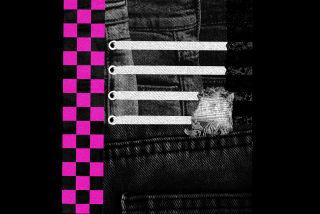A New Drama Begins After Play Is Canceled
AMHERST, Mass. — The sultry heat of Puerto Rico and the edgy tension of New York City could scarcely seem farther from this academic enclave at the foot of the Berkshire Mountains. But a controversy over a high school production of “West Side Story” has the town embroiled in debate over censorship, ethnic identity, artistic license and colonialism.
“As a Latina from the South Bronx, I loved the play the first time I saw it,” said Elizabeth Capifali, a doctoral student in multicultural education at the University of Massachusetts. “But 33 years later, I see it differently.”
It was Capifali’s daughter, Camille Sola, who gathered 158 signatures from fellow students at Amherst Regional High School on a petition protesting the choice of “West Side Story” as the school’s annual spring dramatic production. Soon Camille, 17, was speaking out at a student forum, assailing Leonard Bernstein’s 42-year-old musical for what she considers its unflattering portrayal of Puerto Rican males, its romanticization of gang fighting, its cavalier use of racial slurs and its negative depiction of the island where she hopes to go to college.
In a region where rural poverty lives alongside lavish vacation homes, Amherst is home to the University of Massachusetts as well as Amherst and Hampshire colleges. About 8% of the 1,400 students in the town’s only high school are Puerto Rican, and 28% are students of color. Camille said she was surprised by the reaction to the school’s spirited discussion on racism and ethnicity.
“I had many white students coming up to me, saying, ‘I had no idea this is what you go through every day of your life,’ ” Camille said.
Late last month, within days of the meeting, school administrators announced they would replace “West Side Story” with “Crazy for You,” a cheery 1990s bonbon based on the 1930 musical “Girl Crazy” by George and Ira Gershwin.
Principal Scott Goldman stressed that “West Side Story”--in which the “Romeo and Juliet” story is retold through the street gangs of New York--was not banned but canceled. “This isn’t about censorship,” he insisted. “It’s about sensitivity.”
Still, many of those present at a small rally recently on the town common disagreed.
Local newspaper columnist Larry Kelly, who organized the rally, borrowed from the bard. “Methinks thou doth protest too much,” said Kelly, owner of an athletic club here. “This play gets performed 300 times a year all over the country and nobody complains. This is the first time anybody has called it a racist tract.”
The fervid community response was hardly a shock, said state Sen. Stanley Rosenberg. The majority of the town’s 17,000 residents is affiliated with one of the three colleges, he said, making Amherst “very liberal, very activist and very process- and thought-oriented.” Protest is nothing new: “You’re talking about a community that builds tunnels for salamanders so they won’t be run over on the road during mating season.”
His own point of view, Rosenberg said, is that once a school-based conundrum turned into a community cause celebre, “we got into a censorship battle, and the 1st Amendment lost.”
Rosenberg said he is exploring the possibility of presenting a town-sponsored production of “West Side Story,” along with a discussion of issues generated by the play.
At the John Templeton Foundation near Philadelphia, Arthur Schwartz is a specialist in moral education for high school students. He is also a playwright and former stage manager at New York’s Public Theater. Canceling “West Side Story” was “wrongheaded and shortsighted,” Schwartz said.
“It’s difficult for me to believe that school officials would not be able to stand and say that this classical musical is part of our tradition,” he said. “It’s no different than saying that ‘Tom Sawyer’ or “Huckleberry Finn’ should not be read because of the kind of characters portrayed. Those two novels are about friendship, and what ‘West Side Story’ is about transcends any particular cultural group.”
But long after the students at his high school had left for the day, Goldman said he feared that the concerns of his students were being lost in the community clamor. Most of the calls and letters he received supported the idea of performing “West Side Story,” Goldman said.
But, ultimately, “we had to look at what was going to be the impact on the student community,” he said. Doing a high school musical is supposed to be fun, Goldman emphasized, an experience students look back upon for years to come. Regardless of a play’s content, the production draws together students from different backgrounds who spend countless hours preparing for the performance.
With the community in high dudgeon, said Goldman, “I don’t think our kids should be forced to walk through a picket line. I don’t think high school kids should be put in that type of situation.”
Now, Goldman concluded, “the logical step is to stop pointing fingers and to sit down and hash out where we go from here--and not just intellectually.”
More to Read
The biggest entertainment stories
Get our big stories about Hollywood, film, television, music, arts, culture and more right in your inbox as soon as they publish.
You may occasionally receive promotional content from the Los Angeles Times.










